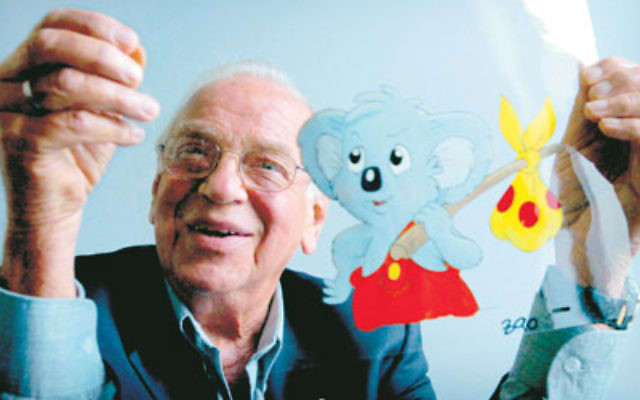Lifetime of cartoon heroes
THE animated cartoon antics of Blinky Bill and Dot and the Kangaroo have entertained millions of kids around the world, thanks to the creative genius of Yoram Gross.
The man behind Sydney’s Yoram Gross Film Studies was born in Krakow, Poland in 1926. He spent much of World War II in hiding and then settled in Israel in 1950.
In Israel, he carved out an impressive reputation as an independent film producer and director in the Jewish State before migrating to Australia in 1968, where he continued his film work and was soon making groundbreaking animated films and achieving industry acclaim.
However, Gross kept his wartime survival stories in the background until he decided to write his memoir My Animated Life, which has been published by Brandl & Schlesinger and will be launched this week.
Written in Polish and translated into English, a considerable part of the 227-page book is devoted to surviving in Nazi-occupied Poland, as Gross and members of his family went from one hiding place to another.
Gross’s father Jakob disappeared when he was 12, believed murdered by the Ukrainians. Then the Nazis ordered Gross, his brother Natan, sister Klara and their mother Sara out of their Krakow apartment to the newly formed ghetto, but they opted to try and survive in the countryside.
With the aid of false documents certifying that they were Christian, they fled by train to Warsaw, surviving by their wits and the help of locals, who despite the risks of helping Jews, fed and housed them and even organised work for Gross in an orphanage.
During the war, Gross was separated from his mother, who had been sent to the concentration camps of Auschwitz and Ravensbruck. After liberation, she returned to Krakow and was reunited with her sons and daughter.
“War told me that you always had to try something,” Gross writes about living by his wits to survive the constant threats of the Nazis.
After World War II, Gross studied musicology at Krakow University, and in 1947 began working in the film industry. He was one of the first students of Jerzy Toeplitz, who established the Polish Film Institute, and later, at the invitation of the Federal Government, the Australian Film and Television School.
In 1950, Yoram moved from Poland to Israel, where he became an independent film producer and director. His first full-length feature, Joseph the Dreamer (1961), was a biblical story that won awards in many countries.
Gross recalls that the Israeli government’s film department decided to enter it in the Cannes Film Festival and sent him on an all-expenses paid trip for seven days.
“I was proud that Joseph the Dreamer was screened at such a prestigious festival even though it did not win a prize,” he says.
Gross received more accolades for his 1958 experimental film Chansons sans Paroles which was described by international film critics as “the most interesting film of 1959”.
In 1968, Gross, his wife Sandra and children Guy and Karen decided to migrate to Australia.
“My experimental films had been enthusiastically received at the Melbourne International Film Festival and by The Age. The newspaper’s film critic said that Australia needed film-makers like me,” he explains.
His first job was producing film clips for the popular weekly television music program Bandstand.
In 1977, Gross and his wife Sandra decided to produce a feature-length animated film set in the Blue Mountains. It was called Dot and the Kangaroo and utilised a special aerial-image technique of drawings over live- action backgrounds with the dialogue performed by leading local actors. It was a hit and won an award for the Best Animated Film at the 1978 Australian Film and Television Awards.
HIS next major film success was another full-length animated film Blinky Bill, based on the Australian children’s classic by Dorothy Wall. This film introduced the popular Australian koala to millions of children around the world. It was followed by the Blinky Bill TV series of 78 episodes.
Then came Skippy, a TV series of another 78 episodes centred around a hopping kangaroo.
Gross says many of his films are for children. “I get more satisfaction out of entertaining children, who are the beginners in life.”
In 1995, Gross received an Order of Australia for his contribution to the Australian film industry.
One of his most recent projects is Autumn in Krakow, a poignant short film on his hometown of Krakow, based on his late brother Nathan’s poetry.
Yoram Gross’s My Animated Life is published by Brandl & Schlesinger.


comments